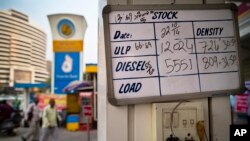Plunging global crude oil prices are turning out to be a boon for India, a country which is heavily dependent on oil imports. Cheaper oil is boosting the government’s efforts to lift the economy from a deep slump.
For decades, subsidies on energy in India have been a huge drag on government finances, but efforts to roll them back have been stalled by a public and political outcry.
However, the nearly 25 percent slide in international crude prices since June provided a rare opportunity for the government to end its controls on diesel prices last month.
Indian consumers barely noticed. The reason: despite the subsidy withdrawal, the plunging global oil prices mean they are not paying more money at gas stations to fill their vehicles.
Economists say tumbling crude prices have brought multiple benefits -- oil is the single biggest import in a country which buys two thirds of its needs from overseas.
For one, they have eased the government’s task of controlling its high fiscal deficit, said economist N.R. Bhanumurthy with the National Institute of Public Finance and Policy in New Delhi.
“This is a pleasant surprise for India, because this is one of the issues that has been on the agenda of the Finance Ministry, bringing down the oil subsidy so that to bring down the overall fiscal deficit. So right now we can very clearly say that this year the fiscal deficit target of 4.1 per cent can be easily achievable,” said Bhanumurthy.
Cheaper crude has also played a key role in cooling inflation, which fell steeply from 10 percent last year to less than six percent last month.
That is good news for a country where high inflation had led to a hike in interest rates, slowing investment and spending by consumers.
But with more money in their pockets and lower energy prices, consumers are again upbeat, buying cars and other goods.
30-year-old Kavita Dey, who bought a new car recently, opted for a bigger one which runs on gasoline instead of diesel. In India, for years consumers preferred to buy vehicles which use diesel, because the government subsidy made it cheaper than gasoline.
“I was initially planning to buy a diesel car, but I did not think it would make sense because the petrol-diesel difference has gone down drastically, and I honestly started off with a very small budget, but thinking that even car prices have gone down comparatively, I decided to buy a slightly more expensive car so that I can indulge myself,” said Dey.
However, experts warn there is a downside to the decline in oil prices. Economist Bhanumurhty fears that the slump in global commodity prices such as crude, coal and gold could signal a slowdown in major economies.
“They are getting into the deflationary phase. [This is] something that needs to be looked at, because that would be biggest risk for emerging market economies like India. Suddenly we see Japan is getting into recession, Germany is getting into recession. So what is happening to the external environment, which actually has a big impact on Indian economy,” said Bhanumurhty.
But for the time being, the government has got more elbow room to put its finances in order, have more money to spend on critically needed infrastructure and woo foreign investors to an economy that is already looking in better shape.




